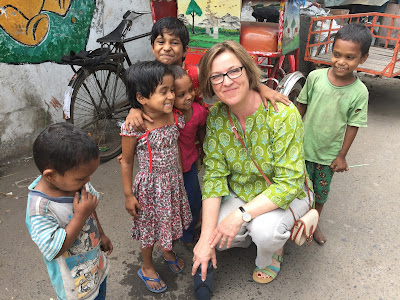What does it take to lift a child out of the slum?
What on earth does an NGO like Tiljala SHED hope to achieve by engaging with a community like these in central Kolkata, so entrenched on the margins of society, despised by everyone, often abused, at best ignored?
Where are the role
models, the ones that broke free, the ones that show us our work is worthwhile
and that change is possible?
Well they do stand
before us - first, in the person of Md Alamgir, founder of Tiljala SHED,
himself of the OBC (other backward castes) community (the Jolah Ansari Momin,
traditionally artisans and weavers of northern India). Alamgir, son of a poor street vendor, got
himself to university and became a teacher.
Wishing to give back to the community which raised him, he set up
Tiljala SHED in 1987. Members of T Shed's staff, the governing body,
volunteers and supporters are also from the community. Many young men and women have stepped out of
the slum and into university. Just this
week we have heard of one of our destitute girls, Madhu, starting a well-paid
job in one of Kolkata's top beauty salons and of another, Shaista, winning an
award for her progress towards her dream of joining the Indian Police Service
and fixing the problems of crime and abuse on the very streets where she
lives. We have Sofia, born in the Auddy
Bagan slum, who has defied all expectations and has just been appointed Block
Development Officer in Kalyani for the Government of West Bengal. And then we have the Prime Minister, Narendra
Modi, himself born into a modest family of grocers in a backward caste - who
resisted an early marriage and rose to the very highest post in the land. He has been responsible for much of the vital
legislation aimed at lifting up the poor and under-served communities, legislation
which lies at the heart of what Tiljala SHED does - helping the poor and
illiterate access and assert their rights - the right to education, identity,
voter cards, ration cards, bank accounts and other financial services.
And this is why our
work is so important. We have to be
there for every child who dreams of something bigger, every child who wants to
help his or her family, every child who wants to correct injustice, to teach,
to heal, to create, to inform. We need
to provide an environment where a child who dreams gets a helping hand, the
tools and opportunities he or she needs to change his or her life.
So 600 children of
rag pickers, rickshaw drivers, maidservants, vegetable sellers are enrolled on
Tiljala SHED's Education and Child Protection programme. They are required to attend their local
government school but in the afternoon they attend remedial classes in T SHED's
5 centres, one in the heart of each community where we work. Here they play, sing, complete their
homework, attend remedial sessions and child protection workshops. They love
the classes and attendance is very high.
Their parents are also closely involved - after all it is only with the
parents' consent that the children remain in education and avoid dropping out. Tiljala SHED works very hard to persuade the
parents that a proper education is worth the sacrifice of anything a boy might
earn rag picking or working in a factory. And infinitely better than marrying
off a daughter as soon as she reaches puberty.
Another key pillar
of the Education Programme comes from all the opportunities that local well-wishers
and supporters provide: an invitation to games and tea in someone's garden; a
trip to a supermarket, to the cinema, a bus trip out into the countryside; a drive
around in a car or a bus; a lecture at a local college; fundraising activities;
a visit from a corporate supporter, a private individual, a bunch of volunteers
asking questions and taking photos. All
these experiences give a child a glimpse of life beyond the slum, away from the
tumbledown shelters, the noise and the chaos of home. These are the experiences that show a child
that there is more to life, something worth working for, a reason to read, do
maths, attend school every day.
This is the
partnership required to raise a child to be the very best she or he can
be: the child's own determination to
succeed; the consent of the parents; support from the wider community; Tiljala
SHED's amazing work.
And the cost of
giving a child the opportunity for a better life…
£11 a month.






Comments
Post a Comment